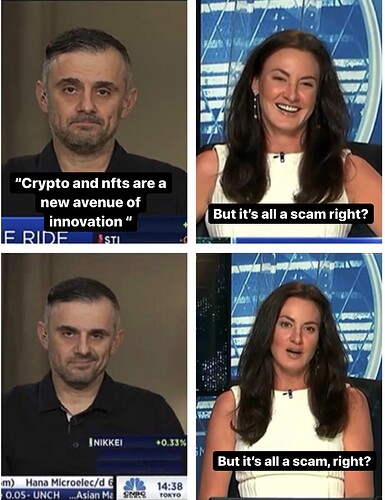Hahaha TheStreet finally submits
I remember back when Digg was thing Gary’s Wine Library TV videos were always pretty popular, it’s impressive to see that he’s still staying on top of technology innovations.
Some friends of friends (assuming it’s guys from their fraternity) tried to launch a golf NFT called crypto country club. Last I checked they had only sold 500 of the 10K initial mint. If they sold all 10K at the initial mint price, it would have been multiple millions. That’s before the royalties or whatever for each subsequent sale.
I’m sure you can get away with small amounts with mixers/tumblers. Billions though, idk.
In that line goes up video he talks about how crazy it is that anyone can drop anything in anyone else’s wallet and all the ways that might be used nefariously (setting someone up, malicious smart contract trojan horse, etc).
I think the scenario he said is that you can’t ever interact with it but it just sits there in your wallet forever waiting for you to screw up (or something like that). Also scenarios where someone makes a mistake and does something with it.
Although modern email programs do a good job of protecting people, email is fundamentally a lot crazier than airdropping tokens. Email is virtually free to send, can have malicious code attached to it, and can convincingly impersonate senders, none of which are true for tokens. Of course just like email, if people click through to associated links and grant financial permissions to whatever they end up landing on, all bets are off.
Since as goofy said a token being “in your wallet” simply means an entry in a ledger on the blockchain, “deleting” the token means creating a filter so you don’t see it.
How does it work when you can’t sell out the 10,000 mints?
Not selling out mint is a hugely bearish signal for your project, so it is probably dead at that point. Aside from that, I mean the rest of the tokens just don’t get created.
do the 500 get minted still or are the contracts setup so that you only mint when all 10000 are sold or does it depend?
text messaging as well. if they send you a message on iphone that includes multiple numbers, you cant even block the sender.
Yeah those 500 are out there on demand
Minting is a blockchain write with everything that implies (costs gas, happens immediately, is public and irrevocable).
And that’s a lot of the beauty of it all. It’s one contract with you sending the money, you getting sent the item, fees and royalties going to wherever they’re going, all in that single transaction executed in seconds
Reading through lecture transcribed into a blog, but is pretty interesting and making the rounds in my tech influencer Twitter. It discusses some of the problems with the technologies and “decentralization” as it exists today.
I hope I’ve said enough to start some discussion. I think there are three basic lines of argument:
- That the externalities I describe don’t exist. You’ll have a hard time proving that the waste of electricity and hardware, and the crime wave, are imaginary.
- That although the externalities do exist, the benefits of decentralization outweigh them. The problem here is that since the systems are not actually decentralized, we get the externalities but don’t get the benefits.
- That although the externalities do exist, and the systems aren’t dencentralized, they’re making so much money that we shouldn’t worry. The problem here is that the amount of actual money you can get out of a cryptocurrency equals the amount of actual money that has been put in, minus the actual costs of mining. So the big picture is that although there may be winners, in aggregate the system loses money.
so from a users perspective, i am willing to pay higher rake in eth gas for an NFT (how much is this for a .04 eth mint?) instead of buying with sol because there will be more live players on the eth network?
Sol also sucks with any substantial type of volume iirc
The first two bullets makes sense (at least conceptually)
The third is answering the wrong question. The economic value of an activity is based on how much utility (or social welfare) it generates, not whether it makes money in some closed system. It’s hard to imagine how any system could “make money” in the way that bullet describes, short of money printing itself.
